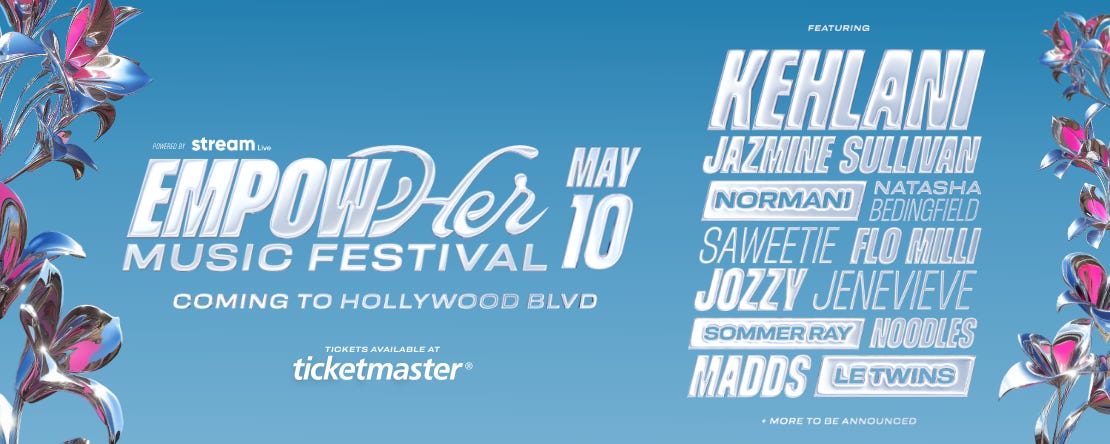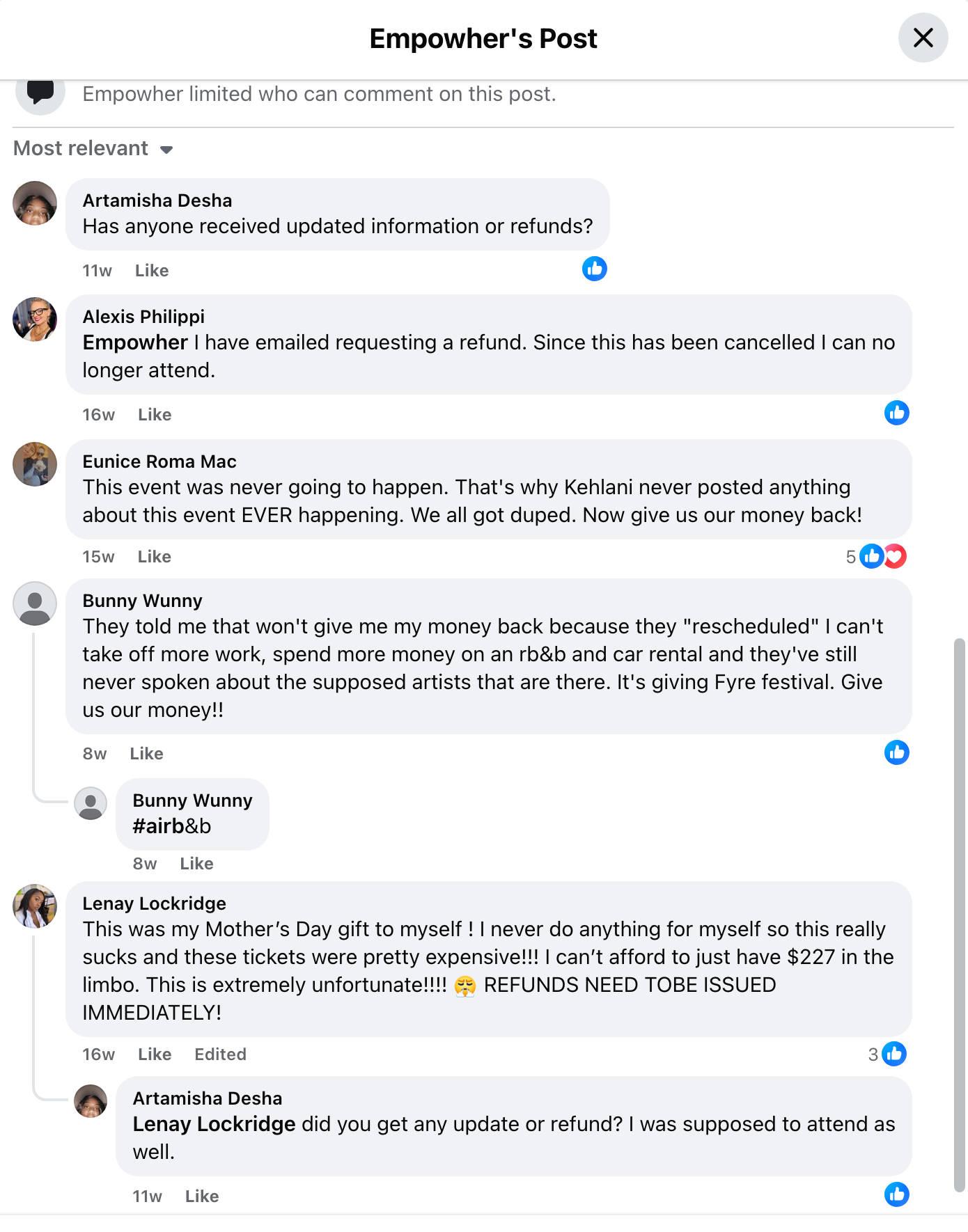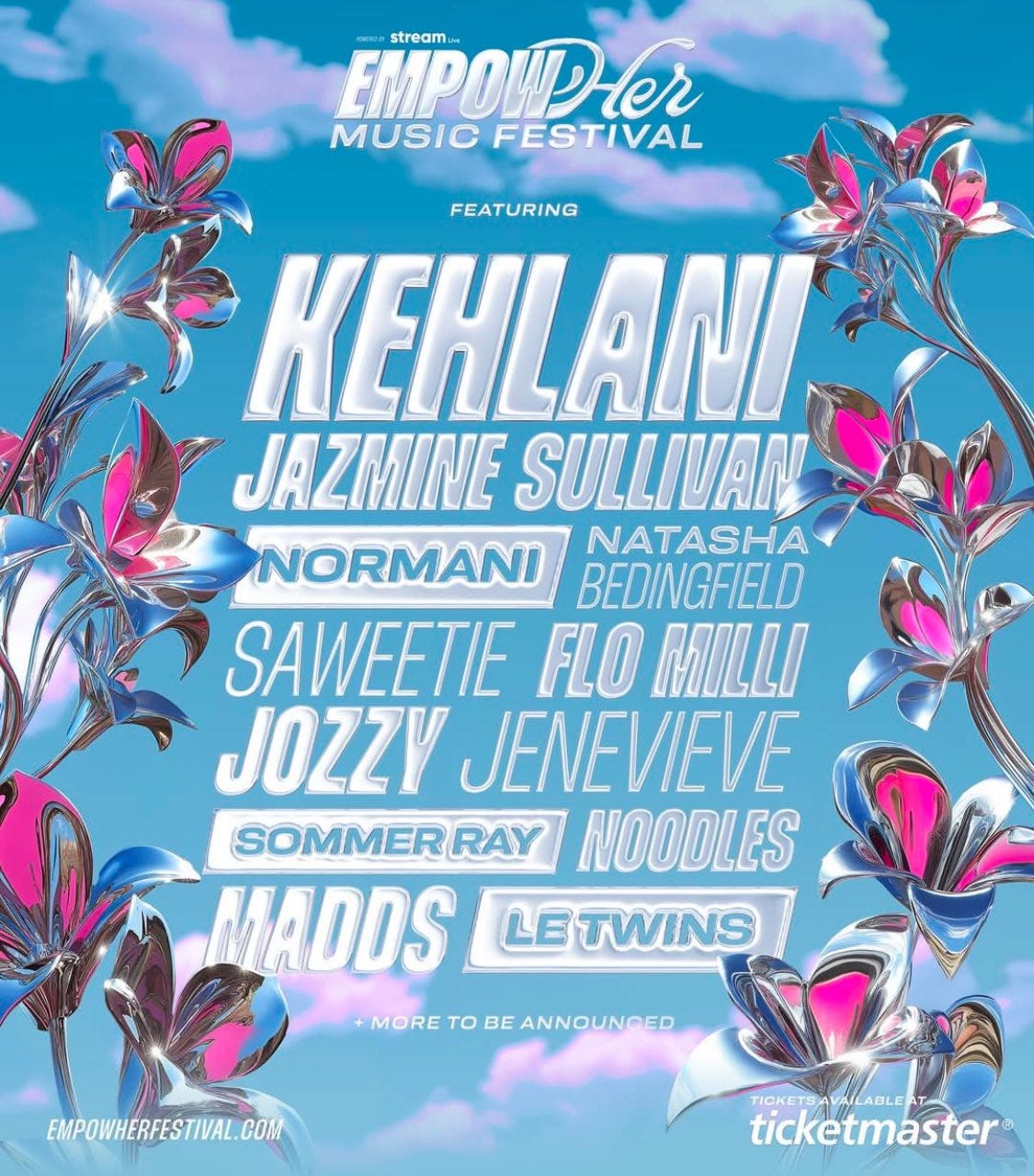How a Promised Celebration of Black Women Became a Cautionary Tale
What the cancelled EmpowHER Music Festival event reveals about empowerment branding and festival culture.
On paper, the EmpowHER Music Festival appeared to be a landmark. Announced for May 10, 2025, it promised to close down 14 blocks of Hollywood Boulevard and fill them with an all-female lineup of R&B and rap stars, including Kehlani, Normani, Flo Milli, Saweetie, and others. Marketing copy leaned into empowerment language, touting not just the music but interactive art installations, wellness zones, and a marketplace of women-led brands. For a generation raised on both festival culture and social-justice branding, EmpowHER was pitched as a celebration of women, particularly Black women, claiming space in the center of Los Angeles.
The promise quickly unraveled. Days before the original date, organizers sent out a blunt email: the event was being “postponed” due to safety and security concerns. A new target of August 9 was floated, but communication dried up. The ticketing site compounded frustration with language that carved out exceptions: cancellations would trigger refunds, but postponements would not. Fans scouring the fine print found the line “all sales are final,” and refund attempts were often denied under that clause. Many were left sitting on airline bookings, hotels, and $200-plus tickets they could not recover.
Public reaction flooded online spaces. The complete lack of communication from the organizers, plus the no-refund language, had people fearing they’d never see their money again. Users on social media asked if the festival was even real, noting that none of the advertised headliners had promoted it, going so far as to say it’s giving “Fyre Fest vibes.” EmpowHER’s Facebook page was filled with comments from fans demanding refunds, with some calling their Mother’s Day gift money now “in limbo.” Without credible communication, the gap between the empowerment message and the lived experience widened, leading to anger and suspicion.
What followed was a pattern of silence. EmpowHER’s social media accounts went quiet. Artists who had been announced as headliners did not promote the new date. The EmpowHER Festival was initially framed as a corrective to male‑dominated line‑ups. By headlining Black women and shutting down a major street, it tapped into a broader cultural moment in which brands and entertainment platforms have begun to embrace the language of empowerment. Over the past decade, corporate campaigns, ranging from beauty products to sportswear, have shifted from objectifying women to promoting feminist slogans. Festivals have followed suit: events like Afropunk and Rebel Girls centre women artists and market themselves as safe spaces for marginalised communities. EmpowHER’s promise aligned with this wave. Its founder, Andy Nematalla, portrayed it as both a festival and a movement. Press materials emphasized that the event would highlight trailblazing women through panels and installations in addition to performances, aiming to create a multigenerational space for fans to celebrate themselves.
If empowerment branding formed the festival’s public face, festival hype culture was its engine. Music festivals have evolved into experiential products, just as much as concerts. Promoters sell not just line‑ups but carefully curated atmospheres, with VIP packages, influencer activations, and immersive zones. Social media marketing fuels this economy; curated feed posts and celebrity endorsements create a sense of FOMO. EmpowHER harnessed these tools. It released glossy promo videos and graphics announcing performers like Kehlani, Flo Milli, and Saweetie. Images of Hollywood Boulevard closed off for a women-only party were widely shared. Tickets priced at around $200 were advertised as investments in a once‑in‑a‑lifetime experience. For many fans, this combination of empowerment language and festival spectacle felt irresistible.
But hype without infrastructure is precarious. Fyre Festival remains the most notorious example. In 2017, the “luxury” festival in the Bahamas collapsed into chaos. Attendees were promised gourmet food and exclusive villas; they arrived to find disaster relief tents, no musical performances, and no flights off the island. Reporting later revealed that Fyre’s organizers relied on influencer marketing and ignored logistical realities. A TIME retrospective noted that “everything from logistics to security, food and accommodation went wrong” and described the event as “Rich Kids of Instagram meets Hunger Games.” The fiasco spawned documentaries on Netflix and Hulu and led to the imprisonment of founder Billy McFarland. Its lasting legacy is a reminder of how easily festival hype can tip into exploitation.
EmpowHER’s stall was far less dramatic than Fyre’s collapse, but the echoes are evident. Both events sold aspirational experiences and used celebrity line‑ups to build momentum. Both events presented themselves as cultural movements. And in both cases, the gap between promise and reality widened as organizers failed to communicate. The difference is that Fyre was exposed mid‑event, while EmpowHER disappeared into a postponed limbo. There is currently no public evidence of deliberate fraud around EmpowHER. Unlike Fyre’s founder, no organizer of EmpowHER has been charged with criminal misrepresentation. However, the festival’s handling of its postponement underscores how mismanagement and opacity can erode trust just as effectively as intentional deception.
The lack of accountability is particularly jarring because EmpowHER centred Black women. Black women are among the least represented on festival stages; when they are headliners, it is often as part of male‑dominated bills. An event promising an all-female, largely Black lineup carried significant symbolic power. Fans bought tickets not just for the music but to be part of a moment of visibility. When that moment did not materialize, and when the organizers treated attendees as obstacles rather than stakeholders, the harm extended beyond inconvenience. It reinforced cynicism about the viability of spaces designed for Black women and deepened the sense that corporate empowerment rhetoric is unmoored from accountability.
How should this episode be judged? Is it a scam? Without evidence of fraudulent intent, it is more accurate to call EmpowHER a case of gross mismanagement. Organisers failed to deliver the advertised product, were unable to communicate adequately with customers, and refused to issue refunds by exploiting a loophole in their own policy. Fans may ultimately recover funds through credit‑card disputes or legal action, but the burden has fallen on them rather than the organisers. This asymmetry is ethically indefensible. When a festival’s marketing emphasizes empowerment, the least it owes its audience is transparency.
EmpowHER’s story also illustrates structural issues in festival culture. Many events are launched by start‑ups or small companies with limited track records. They rely on early ticket sales to fund infrastructure, essentially using customer money as operating capital. When unexpected costs or safety concerns arise, these promoters may lack the resources to pivot or refund. Regulatory oversight is weak; in the U.S., there is no national standard for festival permits, and local authorities often focus on crowd control rather than financial safeguards. Consumer protection laws cover ticket refunds in cases of cancellation, but as EmpowHER shows, a simple reclassification from “cancelled” to “postponed” can be used to deny refunds. Without stricter rules, festival‑goers remain vulnerable.
There are lessons here for future organizers and fans alike. For organizers, transparency must become non‑negotiable. If legitimate safety threats force a postponement, communicate them without endangering security. Provide clear timelines for rescheduling or confirm cancellation. Offer refunds proactively rather than hiding behind ambiguous language. Honor the spirit of empowerment by treating customers with respect. For regulators, stronger licensing requirements and escrow mandates could ensure that promoters cannot spend ticket revenue until the event happens. For fans, due diligence is essential. Research organizers’ track records, read refund policies carefully, and be skeptical of hype that artists themselves do not corroborate. Empowerment is not a commodity; it cannot be bought with a ticket if the underlying infrastructure is absent.
EmpowHER’s future remains uncertain. As of late 2025, there has been no official cancellation or firm rescheduled date. The festival’s website still promises to empower women, but its last significant update was the postponement notice. Ticket holders continue to exchange information on Reddit, for example, debating whether to dispute charges. The artists who were once announced have moved on to other projects. The silence itself is now part of the story—a cautionary note about what happens when empowerment becomes a marketing tool divorced from follow‑through.
Trust, once broken, is hard to rebuild. EmpowHER tapped into a hunger for representation and community, offering women the prospect of seeing themselves centred on a grand stage. It then vanished without fulfilling that promise, leaving fans to negotiate chargebacks and unanswered emails. The episode is about the precariousness of spaces built for Black women in a world where their experiences are often commodified and then discarded. Until organizers learn that empowerment requires accountability, the gulf between hype and reality will continue to breed cynicism. And until fans demand accountability, the next EmpowHER may already be in the making.






Wow thank you for this piece. I had no idea about this “festival.”